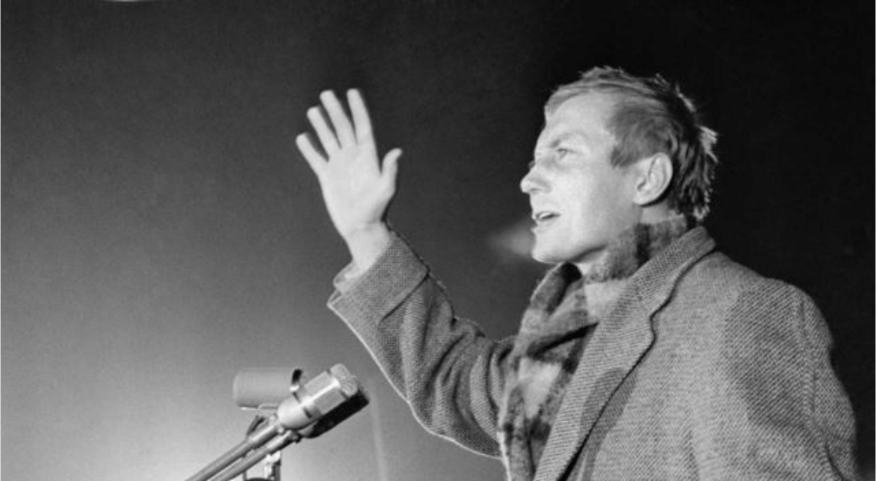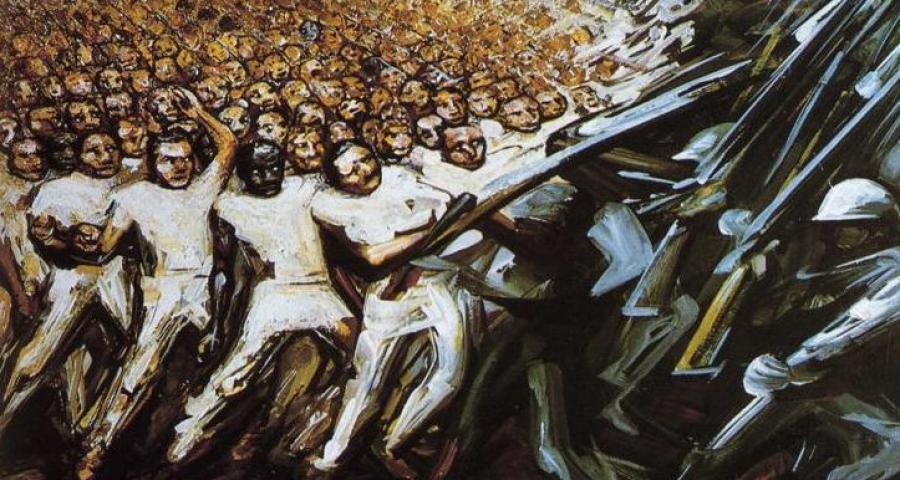Today’s generation is raised under a dark shadow of intellectual pessimism. To be sure, it is a pessimism entirely justified by the entire experience of the 20th century as well as the 21st century up to now. But the function of a revolutionary in this is to fight, to rekindle the socialist imaginary, not because the outlook is good but because there is no other option. Our choices are to resist or be consumed. Revolt can be a joyous festival, a celebration of a future yet to be birthed. This is what Vladimir Mayakovsky[i] meant when he said, well before he shot himself, that “joy must be ripped from the days yet to come.”
Read moreThe English translation of Richard Wright’s address to the Revolutionary Democratic Assembly in Paris in December 1948 seems to have escaped the notice of the biographers and literary scholars who have otherwise been extremely thorough in documenting the author’s life and work. And that neglect is all the more remarkable given the speech’s substance. A major defense of radical political and cultural principles at a moment when the Cold War was turning downright arctic, it is also a credo, a statement of personal values, by the preeminent African-American literary artist of his era.
Read moreHugh Masekela was one of the last great jazz men of the twentieth century. Both his life and music were shaped by transatlantic political and cultural currents that ebbed their way through the slums of Johannesburg and the jazz dives of Harlem. His death has produced two broad depictions of the man: Masekela the founder of the South African Jazz sound, and Masekela the activist who used music to raise attention to the injustices of apartheid. Neither of these are inaccurate, but they do little to capture the complexity of the man or his music.
Read moreWhen I heard that The Fall’s frontman (and only consistent band member) Mark E. Smith had died, I didn’t even realize The Fall released a new album in 2017. I consider myself a pretty good fan, I can name a bunch of their albums, know some of their songs inside and out, have read dozens of interviews and articles about the Fall – and yet it totally slipped my radar they had a new album. But to be honest, Smith just got too much for me and after album after album, just got a bit burnt out by how their sound would have that similar weird feel, but just wasn’t as amazing as it could be.
Read moreI had a friend who as a child wrote to Ursula Le Guin. He was feeling miserable, bad things had happened to him and he wanted to run away to Earthsea. He told her that he felt ashamed that he wasn’t facing up to life, felt it was a failing that he just wanted to live a fantasy. Ursula Le Guin wrote back, sending him a postcard. She told him that imagination and fantasy weren’t something to be ashamed of, they were what made us who we are. My friend kept that postcard with him wherever he went.
Read moreWhat is the relationship between artistic movements and the historical periods during which they first appeared? Can the methods associated with these movements be detached from their original context for the benefit of later artists? Do the answers to these questions depend on which movements and periods we are discussing? The issue is of more than academic interest. Serious contemporary artists want to produce work relevant to, and critical of the societies in which they live; but in doing so, are they free to draw on any methods, from any point in history, or will only some be adequate to their needs? Should socialists expect them only to work with particular methods, and criticise them when they do not?
Read more“Leveler” was coined in the 17th century to describe those who tore down hedges in the Enclosure Act Riots. It was later generalized. As long as the working-classes have sought political and economic leveling these aspirations have been expressed in art and culture – from the social gospel of Matthew to the gestures of punk and early Hip Hop. Aesthetic leveling can be used in ways that divert class anger toward the wrong targets or toward personalized solutions. But it also can express movement toward proletarian consciousness. And the socially promiscuous artist – coming from, and historically mixing with, all classes – is often predisposed toward leveling (as well as a political volatility that produces the aforementioned variations).
Read more“No one today can reasonably doubt the existence or the power of the spectacle; on the contrary, one might doubt whether it is reasonable to add anything on a question which experience has already settled in such draconian fashion.” – Guy Debord, Comments on the Society of the Spectacle, 1989
Within five years of writing these lines, Guy Debord – author, filmmaker, and leader of a coterie of radical intellectuals known as the Situationist International – despairing at the ever quickening advance of the society he opposed, brought his own life to an end. He had lived long enough to see the collapse of the bipolar world order of the Cold War and the Americanization of the world.
Read moreThere’s something strange about the strange – and unpacking that something is the task Mark Fisher sets himself in this lucid little book. The Weird and the Eerie marshals a series of essays into a sharp theoretical intervention, argued tightly and packed tersely into 120 pages.
Specifically: there are two distinct modes of the strange – the weird and the eerie – and this distinction revolves around the different ways they deal with exteriority. The weird involves an irruption of the out-there in here: “the weird is that which does not belong”, hence its close affinity with fantastic fiction.
Read moreIt’s about time. Not the obvious reaction when one of your heroes dies. But Holger Czukay was all about time. Not just in the sense, as Can’s bass player, of playing in time, though few could better that Czukay (just listen to “One More Night”), but in the sense of sequencing time: ordering and shaping it, as an editor. Between the two approaches, his two roles, Czukay created a sense of time speeding up, time slowing down, time as an elastic, malleable essence. Working against the regulation, the containment of capitalist time. But Holger Czukay is all about time in another sense. Due to both forming a band late – in his thirties – and dying relatively late in musician terms, Czukay’s life spanned a huge stretch of history and culture.
Read moreThe Struggalo Circus, a group of radical activists who are also dedicated fans of Insane Clown Posse and Psychopathic Records, were finishing their preparations before we headed to the Juggalo March. The four (nom de guerres: Ape, Dimension, Kitty Stryker, and RaiderLo) had split a hotel room in Chinatown, waking up early to don their regalia. Ape, his fully made-up face framed by bleached blonde hair and beard, looked oddly appropriate for the juggalos’ leap into DC protest politics: he wore a suit. “I dress like this all the time,” he told me. During the day he fielded at least a dozen interviews.
Read moreIn early 1940, just before he attempted to escape to Spain from Vichy France, the Marxist theorist and art critic Walter Benjamin penned his Theses on the Concept of History. In twenty numbered paragraphs, Benjamin sketches his vision of the task of the materialist historian. In contrast to the historicist, whose method consists of merely adding “a mass of facts, in order to fill up a homogeneous and empty time,” the materialist historian employs a “constructive” method (XVII), piecing together the “tradition of the oppressed” (VIII) from the rubble of the catastrophic past into a “constellation” (XVII) that most accurately reflects the fragmented character of modern reality.
Read moreRed Wedge is delighted to share an excerpt from Matthew Flisfeder’s book Postmodern Theory and Blade Runner (2017). The book is part of the Bloomsbury series Film Theory in Practice, edited by Todd McGowan. This excerpt comes from the end of the second chapter.
With a sequel coming up later this year, the time to revalue Blade Runner as a profoundly historical film has come. The film was made during a critical transition point within the history of capitalism.
Read moreThe intelligentsia has been re-traumatized by that dastardly Dylan. First, they had to put up with the very fact that a “rock singer” (or however we label him) is winning a prize that is supposed to be for literature. As Bill Crane put it last fall, “The middlebrow literary establishment in this country, as may have been predicted, has completely failed to understand the significance any of this.”
Crane makes an exquisite formal and substantive argument in defense of Bob Dylan as a poet, though takes a position typical of the Left regarding Dylan’s “turns” after his classic activist period.
Read moreIn 1871, Parisian workers famously brought down the Vendome Column in the city’s first arondissement. It was an iconic event – in more way than one – for the Paris Commune. The Column, erected sixty years previously in commemoration of Napoleon’s victory at the Battle of Austerlitz, was torn down at the initial suggestion of the legendary artist Gustave Courbet. Courbet called the Column “a monument devoid of all artistic value, tending to perpetuate by its expression the ideas of war and conquest of the past imperial dynasty, which are reproved by a republican nation's sentiment.”
Read more“After one has enjoyed the first taste of Marxist criticism, one will never again be able to stand ideological hogwash.” – Ernst Bloch, Spirit of Utopia, 1918
The relationship between art and society has always been a central question for artists, thinkers and activists on the Left. In the twentieth century, it was commonplace to believe that art has the power to change the world. It was this conviction that motivated Georg Lukács to defend the literary realism of writers like Thomas Mann over the stylistic innovations of a James Joyce. For Lukács (1977: 33), literature was “a particular form by means of which objective reality is reflected,” and as such it was “of crucial importance for it to grasp that reality as it truly is.” By displaying social reality in all its contradictory complexity, Lukács believed, art could serve the interests of class struggle and social emancipation.
Read moreIn 2015 it became clear that Viktor Shklovsky’s imperative to “make the stone stony” is a much simpler task than “making the corpse corpsely.” I am thinking of the use of autopsy transcript as poem, Kenneth Goldsmith’s appropriation of the shooting death of Michael Brown. [1] While this particular text was said to be uniquely parasitical and vampiric, likely as much for its arrogance as its form, it should be understood as the logical product of an aberration in American documentary poetics that has recently adopted the brand name “Conceptualism.” Goldsmith’s personal framing of Conceptualism holds that all that must be written has been written and must merely be re-packaged
Read moreIn the Spring of 1940, as the Nazis conquered France and were the dominant power on the European continent, the exiled German Marxist philosopher Walter Benjamin wrote his final work, Theses on the Philosophy of History. In a moment of political defeat, with fascism triumphant, the parties of the far left lying prostrate and subjugated, Benjamin penned the following words...
Read moreChina Mieville’s novels are genre fiction at their best. They can be largely grouped into two broad categories: Twisted takes on British and European urban life (The City & The City, King Rat, Kraken) and kaleidoscopic, imaginative, and often Marxist fantasy and sci-fi adventures (The Bas-Lag trilogy, Embassytown). This changes rather drastically with This Census-Taker, Mieville's latest, which combines trace elements of magical realism and fantasy with the minimalism of authors like Hemingway and Cormac McCarthy. This odd mashup works to produce a narrative that is engrossing, thought-provoking, and perhaps excessively ambiguous.
Read moreThe robots have arrived – sort of. It’s only a matter of where one looks. If one were paying attention to the Oscars this year, it would have been hard to miss the most famous robot trio of all time as they arrived on the opulent stage of the Dolby Theater. Ahead strutted in the pleasingly neurotic, bronze figure of the linguist, C-3PO, with his short, stout, and sassy mechanic mate R2-D2 close behind, and bringing up the rear the white-orange ball of a droid named BB-8, who made its debut in Star Wars: The Force Awakens, released this past December. When R2-D2 beeps that C-3PO forgot the tickets to the ceremony, the latter retorts: “The ticket was your job, nitwit.” When told that he looked somewhat like the Oscar statue behind them, C-3PO declared that it looked like him. “How do you think we made it this far?”
Read more















